Remember when establishing a Latin American operation was about nearshore access to lower-cost labor? That may still be true of some markets in the region. But investors in Costa Rica, particularly in IT, creative & corporate services, life sciences — mainly medtech — and smart manufacturing sectors, are there for far more strategic reasons. For one, they can deliver client service, high-end innovation solutions either at par or above the level of other key locations in their global portfolio. In short, that is what makes a Costa Rica presence not just desirable, but essential.
"When McKinsey first established its operations in Costa Rica in 2010, we found great talent, a welcoming government and stable environment," says Robert Tesoriero, Senior Research Manager at global consulting giant McKinsey & Co. "The first functions to migrate to our Costa Rica Service Center included our IT team, Visual Graphics — which helps consultants produce client presentations — and business researchers. At that time, much of the innovation was focused on improving and standardizing processes, how these services are delivered to our internal customers and performance management."
And now?

“Since we established operations in Costa Rica, we have appreciation for the excellent business and political environment to help develop our operations. This good experience, along with the excellent workforce we found, has supported our decision to proceed with our plans to build a modern, state-of-the-art heart-valve manufacturing facility in Costa Rica to support our long-term growth aspirations.”
"The culture of innovation has changed significantly," says Tesoriero. "We now have capabilities that play a key role in helping our firm serve clients. For example, we built an advanced analytics team in Costa Rica, with analysts now consistently staffed at client sites as part of consulting teams, helping to solve big data problems. In Costa Rica we also now have a Design Center, which advises and helps consulting teams communicate with clients through video and 3D models. Our 130 New Ventures colleagues serve clients directly through solutions and have helped build the next generation of capabilities."
New Ventures is a recently formed part of McKinsey focused on "fostering innovations driven by analytics, design thinking, mobile, social and other technologies, and integrating them into our client work," according to a description from the firm. "It is a foundation for — and expands our investment in — our entrepreneurial culture. A primary objective is to offer practical solutions and tools that help people at all levels of an organization generate insights they need to address both strategic and day-to-day decisions."
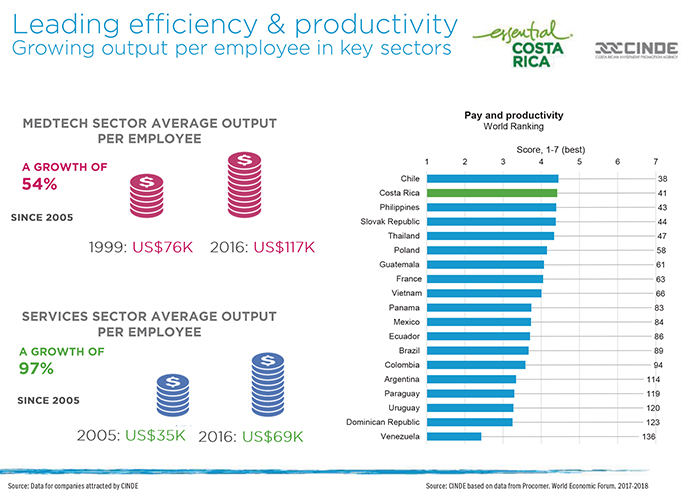
Talent Is the Secret Weapon
Think of the Costa Rica operation as the place that makes McKinsey’s already highly regarded consultants look even better. Tesoriero puts it more elegantly: "We have seen a shift from a focus on efficiency gains, to greater attention on how teams in our center can better serve clients and better enable our consultants to serve clients."
All of which requires a caliber of talent that would have been out of reach in Costa Rica and most other places outside the leading business markets not long ago.
"As we have added more complex processes to our center, we have changed our recruiting strategy," Tesoriero affirms. "While we continue to recruit highly talented graduates from local universities and technical schools, we also focus now on recruiting more senior, experienced professionals who have advanced degrees and come with expertise developed from prior roles. We have also begun hiring more senior profiles who come with deep skill sets within technology, digital and analytics."
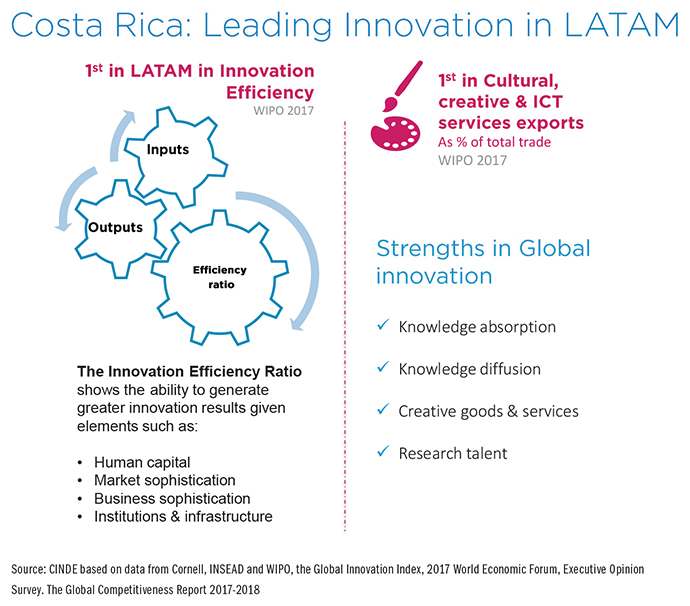
On a practical level, what’s happening at McKinsey’s Costa Rica location? Lots.
"The McKinsey service center has a broad set of functions and capabilities," Tesoriero relates. "The co-location of so many different teams has helped fuel innovation. As an example, a tool called SILA, Start-up Investment Landscape Analytics, was developed in our Costa Rica Knowledge Center. This tool helps clients make decisions about organic and inorganic growth opportunities. The SILA team based in Costa Rica serves clients globally.
"Our center in Costa Rica has developed a reputation of providing best-in-class service and support to McKinsey consultants primarily in the Americas, better enabling them to serve clients," he adds. "The center has also become a hub for client-serving capabilities such as New Ventures, Analytics and the Design Center."
How Intel Stepped Up Its Game
Is the same degree of success in Costa Rica possible in the IT sector? Intel bet 20 years ago that it is possible, and that bet is paying off.
"Arrival of Intel in Costa Rica was an inflection point in regard to the type of foreign direct investment attracted by the country, a transition from labor-intensive activities to more high technology and services," says Timothy Scott Hall, Government and Public Affairs Manager at Intel Costa Rica. "Costa Rica started competing in higher-value-added sectors as part of its quest to enable new development engines using its competitive advantages."

“Intel Costa Rica is part of a global value chain, and today we fulfill functions that are very important within that chain. One of our units validates samples of most of the Intel portfolio products, and that is necessary so that they can go to high-volume manufacturing. Costa Rica offers a good business ecosystem, where there is high-level human capital.”
Intel was a pioneer at the time, Hall relates, and a catalyst for Costa Rica’s emergence as a higher-value location for a broader range of industry sectors.
"The installation of Intel in the country generated a series of positive impacts, from the generation of employment, to interaction with the national innovation ecosystem and with higher education centers for the transfer of knowledge, to the attraction of other companies," he explains. "This has allowed the country, thanks to its Productive Development Policies, to encourage the growth of activities linked to innovation, research and development."
Intel’s Costa Rica operations are divided into two large excellence centers: a Research and Development Center and the Global Service Center. The latter performs multifunctional tasks in Finance, Human Resources, Sales and Marketing, Quality and Information Technology, some with global coverage and others at a Latin American level or throughout the Americas. At the Research and Development Center, engineering teams create prototypes, test and validate solutions for integrated circuits. It also houses the Megalab, which is unique in its class within Intel and the only of its kind globally outside California.
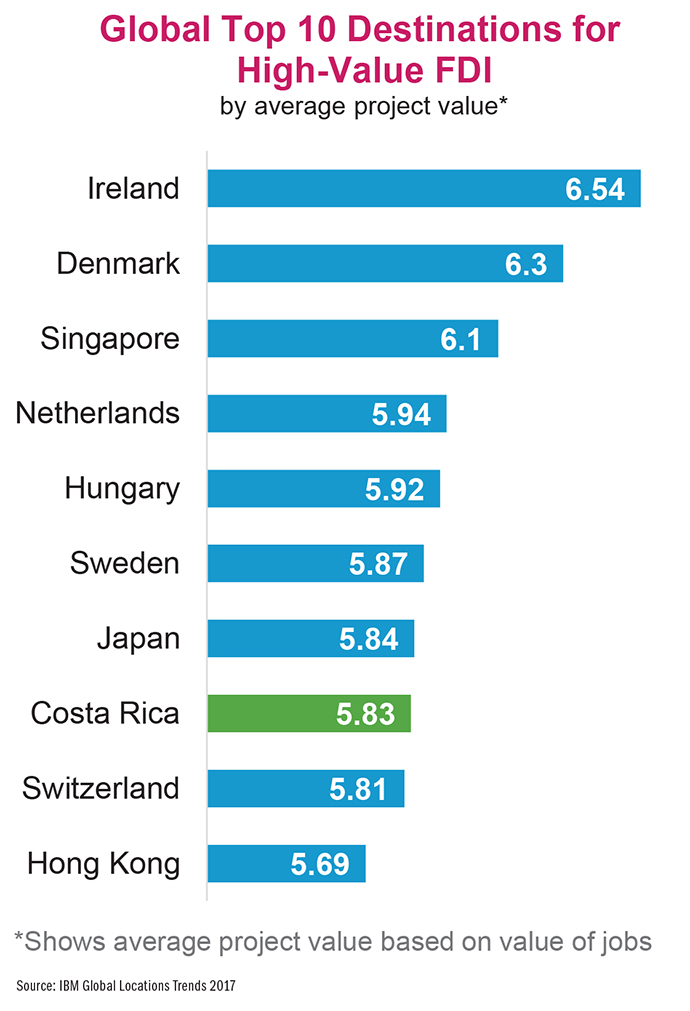
"During the 20 years of being established here, the human talent of Intel Costa Rica has been key to advance," says Hall. "The creativity, passion, optimism and boldness of each of our collaborators have allowed us to continue adding value to the country and the corporation."
The rapid rise of Intel’s Costa Rican operations up the value chain has required close attention to the workforce and its compatibility with the tech giant’s needs. Hall puts it this way: "The transformation of the operations of Intel Costa Rica, in 2014, led to a rise in the global value chain, moving from assembly and testing activities to research and development, concentrating our operations in the two large centers. We now require more specialized personnel. The profile of the collaborators is mainly university graduates in careers in engineering, administration, human resources and finance, among others.
"Today," he adds, "we have highly qualified personnel working shoulder to shoulder, in real time, with Intel engineers in different parts of the world, offering solutions and validating our product portfolio before going to high-volume manufacturing. Intel, since its arrival in the country, has maintained a close relationship with universities, public and private, to transfer knowledge and have access to professionals to develop skills and abilities that the sector needs to continue growing."
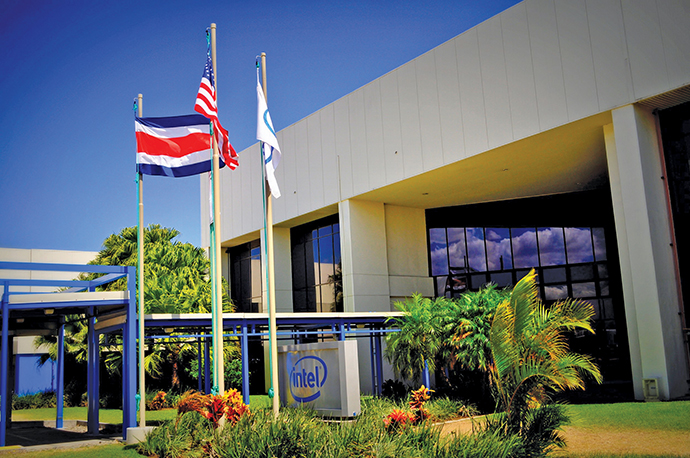
Costa Rica, like many markets, could improve its percentage of students specializing in STEM curricula and engineering on the university level, noted Hall. But even still, he points out, "As of today, 99 percent of the 2,100 employees we have at Intel Costa Rica are Costa Ricans."
Is Costa Rica an essential location to Intel?
"Intel Costa Rica is part of a global value chain, and today we fulfill functions that are very important within that chain," Hall responds. "For example, one of our units validates samples of most of the Intel portfolio products, and that is necessary so that they can go to high-volume manufacturing. Costa Rica offers a good business ecosystem, where there is high-level human capital. In addition, it has a privileged geographical location."
A Partner for Successful End-to-End Strategies
What is behind Intel and McKinsey — and many other multinationals — enhancing their Costa Rica operations for higher value functions? Why is this phenomenon now ubiquitous in this market while it is slow to catch on elsewhere in the region? Jorge Sequeira, General Director at CINDE, Costa Rica’s national investment promotion agency, explains.
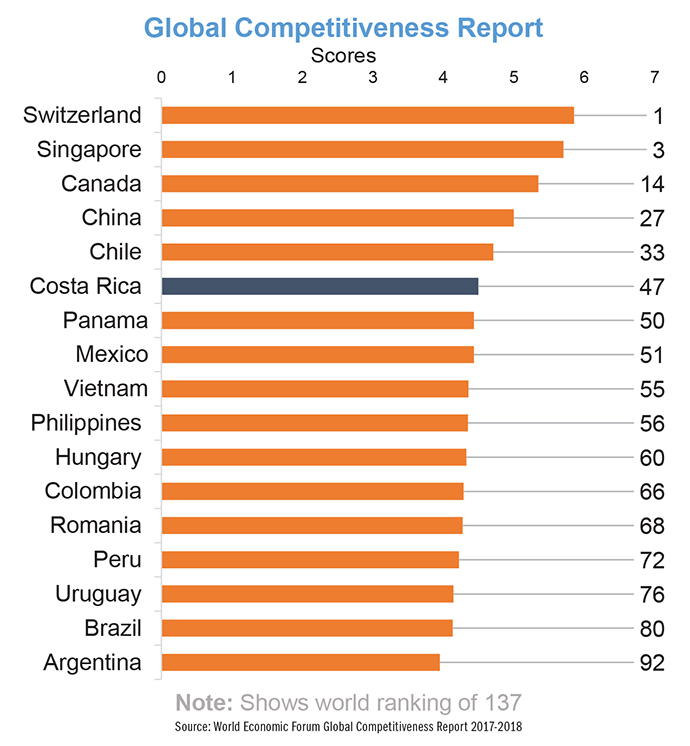
"Ever more so companies are shifting their strategies towards end-to-end solutions, and Costa Rica is an ideal partner to enhance that value chain," he relates. "Multinationals in manufacturing leverage the country´s free trade platform to optimize their supply chain strategies either by sourcing from locations that provide preferential access to production inputs, or sourcing locally from a robust network of providers, which is currently ranked number one in local supplier quality in LATAM by the World Economic Forum. Moreover, the country´s increased expertise in back-end and IT processes has made it possible for several manufacturing operations to incorporate regional or global services hubs that serve and support their subsidiaries and clients abroad. The most current evolution in this integration chain has been towards distribution centers, incorporating logistics and supply chain planning and operations to deploy key product lines to end markets around the world, from the Americas, to Europe and Asia; as well as the most complex steps in sustaining engineering, design and innovation"

“Costa Rica is a country that offers high qualified human talent. This is why we decided to continue investing in the hiring of Costa Rican personnel. We are currently more than 5,000 people who are part of this company.”
Creativity is also a common trait in Costa Rican talent. The country has learned to make the most of it, and so has Accenture. This IT leader started in Costa Rica by providing digital creative services to other destinations, but it quickly evolved. Fabricio Soto, Country Manager for Costa Rica, explains how Accenture knows what is trendy before it becomes trendy. In an interview he shares how "In Costa Rica we have been able to do this by shaping the talent and unlocking human resource potential through training, processes and operational excellence." The company has its Digital Production Center of Excellence globally in Costa Rica. Which means that the Costa Rican team helps supervise and share best practices with other digital centers in other locations around the world such as India, Spain, Colombia or Brazil.
Another case in point is WMware, which employs about 700 people in Costa Rica.
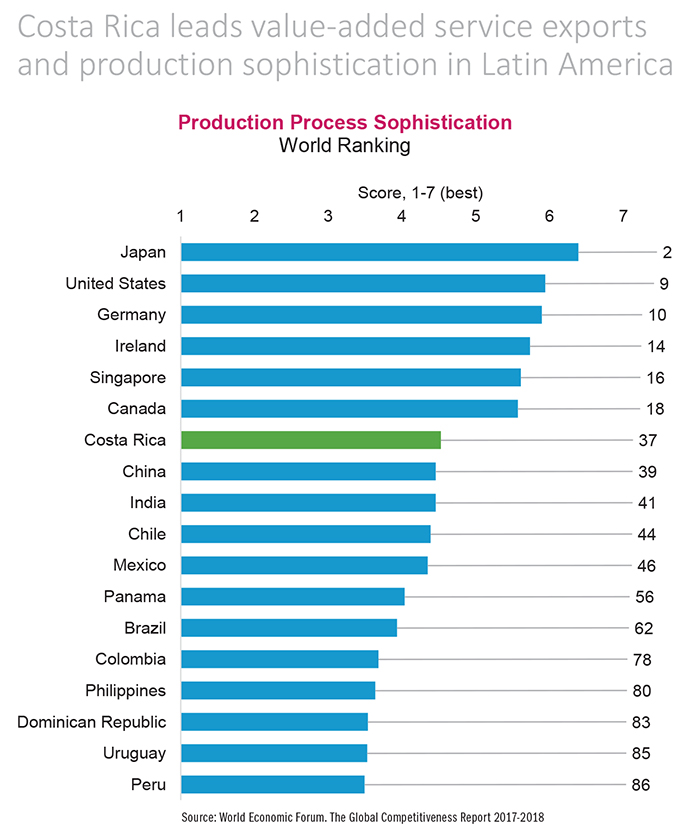
Costa Rica is the biggest center of operations of VMware in Latin America. They have bigger operations in India, but the Costa Rica operation is the most "multi-divisional" one, that is, the one that has the most divisions servicing from one site, providing a broad scope of versatility. They started with sales support, then back office, then internal digital communications, and now are incorporating a business intelligence unit. Vmware´s country manager shares how "The talent we find in Costa Rica is simply amazing. What you can see out of Costa Rica is passion because people are here to innovate, people are not afraid to actually challenge the status quo and create something new."
An Essential Partner
Whether a company uses a captive or outsourced model to manage key functions is indifferent as to the quality of processes it can expect in destinations such as Costa Rica. Either way, Costa Rica proves to be a valuable partner.
"For Bacardi, we have been able to prove our position as a key location for the Global Business Service Center (GBS), which serves around the clock, 24/7, locations from Australia and Asia to the Middle East, Europe and the Americas," says Sequeira. "In other cases, operations serve regional functions such as at Roche. With a division focused on clinical trials and reaches, its unit serves the Caribbean and Latin America in pharma-vigilance, regulations, registrations and the like.
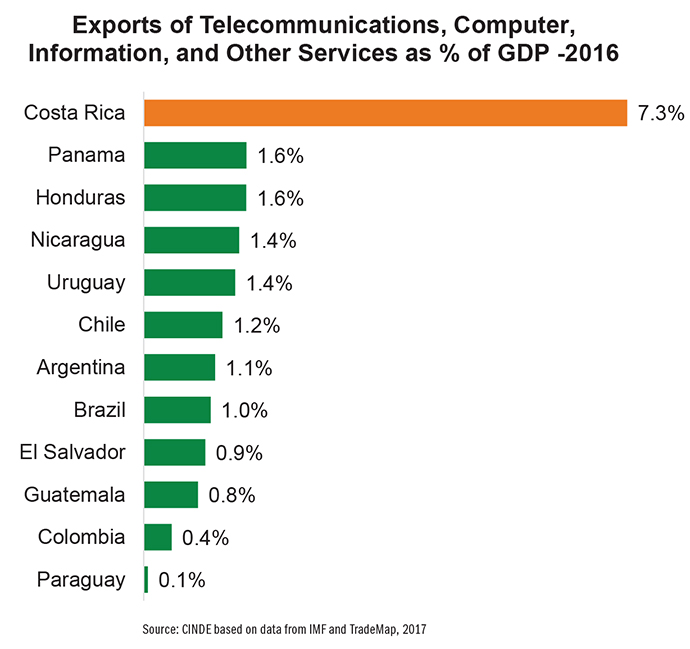
"The capabilities of Costa Rica´s talent are the biggest proof points for these company´s strategies," he argues. "For example, P&G has been in the country for over a decade. Although the company does not have a manufacturing site in Costa Rica, it designs all supply chain strategies for its Latin American operations from Costa Rica."
Are Costa Rica and CINDE plateauing in their ascent up the talent value chain as corporate services become more integrated? Hardly.
"As the new wave of services strategies surge and the incorporation of AI and robotic process automation (RPA) come into play, Costa Rica is moving ahead of the wave," Sequeira maintains. "CINDE is working closely with several multinationals including Citi and EY, which are becoming centers for testing and development of RPA applications that can then be deployed to other locations. In addition, a company like GBM (Cognitiva), a spin-off of IBM, is doing the entire customization of IBM´s Watson Cognitive Computing to tailor it to Latin America, all from Costa Rica."
Meanwhile, watch for industry sectors to discover real and potential synergies with other industry clusters — biotech and agriculture, for example, or medtech and IT. This process is, in fact, well under way. More than 160 knowledge-intensive IT companies and 70 medtech companies — including six of the top 20 cardiovascular firms and nine of the top 20 OEMs — are active in Costa Rica. Many are actively studying opportunities for convergence and the E-health specialty they will contribute to this emerging ecosystem.
“We’ve found a strategic growth partner for the company in Costa Rica, due to the vision that the government has had to invest in education and welfare of its citizens, which has enabled us to find highly capable and committed talent. This has allowed us to grow much more than expected, expanding the roles and functions initially considered and accelerating our vision of being a center of competitive excellence. As a result, it has allowed us to position ourselves as one of the best companies to work for in the region, being recognized by the Great Place To Work Institute during the last four years of the five that we have operated in Costa Rica.”
Medical devices developed in Costa Rica are increasingly patient-specific rather than mass produced, thanks to these synergies. This is possible now because of the creativity and talent resident in Costa Rica. Higher-end IT talent now in strong supply means devices are more effective, customizable and more likely to result in the desired outcomes.
Boston Scientific started with endocrinology devices, then cardiovascular. Now they have over 100 engineers in sustaining engineering and development of new products. Baxter started in the late 1980s with manufacturing of intravenous sets, then in 2005 opened a Shared Services operation which served the Americas: F&A, HR (talent acquisition), global finance and non-finance processes and analytics services in English, Spanish and Portuguese.
Cyber Safety and the Talent to Keep It Safe
Multinationals today are more sensitive than ever before to security associated with their data, and their access to talent that can meet and overcome that challenge. They necessarily will view locations through that prism. How does Costa Rica measure up?
"The scale of Costa Rica, as a boutique location, allows it to respond to global trends," says Sequeira. "Through the efforts of CINDE, the country creates strategic alliances with collaboration both from multinationals in the country as well as other international academic institutions. Thus, programs such as training courses in cyber security, given at the Costa Rican Technological institute, are designed by companies like Infosys and IBM. Other alliances have also been established with institutions such as Georgia Tech to enhance and deliver programs in cloud computing. The country has designed over 30 different training programs both at the technical and university levels in response to the needs of investing companies."
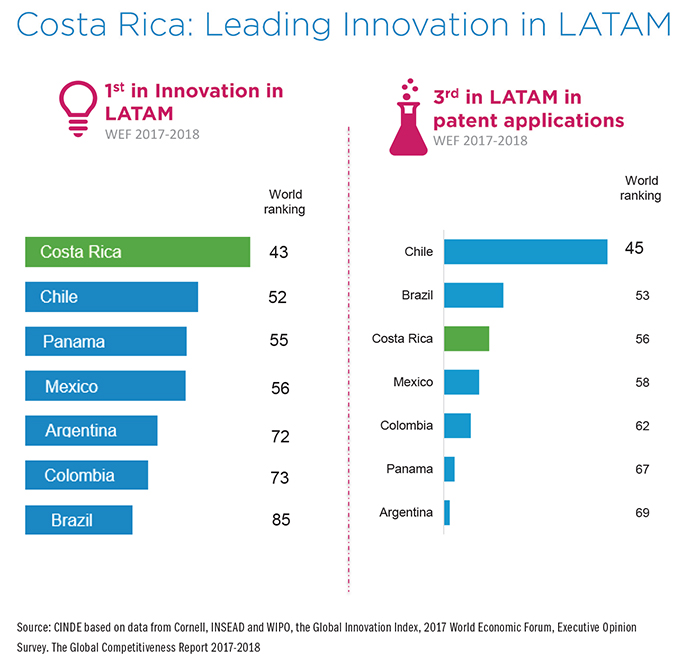
"In the manufacturing area for example," he relates, "Costa Rica has developed a collaboration between the University of Minnesota and TEC in Costa Rica, and it now has the only master’s degree in Medical Device Engineering in Latin America. Other collaborations with Stout, Rice University and Fraunhofer Institute in Germany also allow for skills improvement in new materials, new device design and the like."
Companies intrigued by what they can accomplish in Costa Rica will want to know what resources CINDE will make available before, during and after operations are launched. They will find those typical of IPAs and some that are not, notes Lachner.
How CINDE Facilitates Success
Investors will find in CINDE a level of professionalism and industry knowledge that earned it both the number one IPA designation from the International Trade Center of the United Nations and a Top IPA for Latin America recognition from Site Selection magazine for three years in a row.
"CINDE has several active groups of investing companies which gather together on a regular basis to provide feedback and discuss forward-looking needs for their operations," says Sequeira. "Through our Business Climate unit, CINDE drives the promotion of enhanced features for investment including talent development. The results are strategic alliances with local and international academic institutions, implementation of new training programs both at the technical (Ministry of Education or Training Institute Levels) and university levels. We have an R&D Hub program where multinationals that are incorporating these types of processes or initiatives participate, share practices, approaches, challenges and foresight."
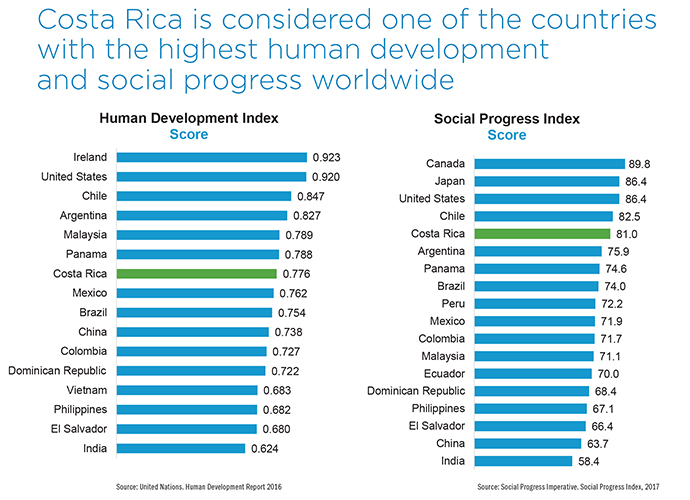
The result is the increasingly skilled, enthusiastic and competitive workforce Costa Rica brings to the table. All the understanding of today’s business dynamics — shared services strategies, integration of corporate functions where appropriate, and higher value added across the spectrum of what companies deliver — is just understanding without the people that make it happen on the ground, in the real world. It’s why multinationals in Costa Rica are evolving so rapidly beyond their original purposes for having operations there. It’s why they consider Costa Rica to be essential.
This Investment Report has been prepared under the auspices of CINDE.
For more information, visit www.cinde.org.

